Stephen Roney's Blog, page 259
January 28, 2020
Pardon My French
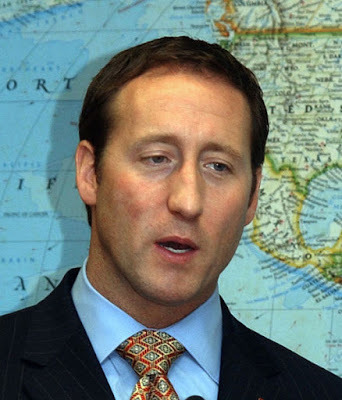
We have a problem.
The Quebec press is already making noise about Peter MacKay’s weak French. It is immediately a big issue in Quebec. He has been in public life forever, they say. Why has he never made the effort to learn French?
He took no questions after his kickoff announcement. Perhaps to avoid any questions in French. He cannot do that for long.
This seems to me a fatal flaw. Never mind losing any competitiveness in Quebec. It matters almost as much in Ontario, because Ontario considers itself profoundly vested in preserving Canadian unity.
At this point, MacKay’s only credible opponent is Erin O’Toole. Erin O’Toole’s French is apparently not much better.
So it is not just that the Tories are going to end up with a unilingual leader; there will not even be a prominent candidate who speaks good French. At best, Quebec is likely to tune out. At worst, it begins to look as though they don’t think about Quebec, have no sense of Quebec. Quebec tends to nurse grievances over this sort of thing that can last for many years.
What an epic disaster it turns out to have been that the Conservatives did not choose Max Bernier last time. He was their most prominent Quebec politician. At the time, he was running on a libertarian platform, economic conservatism with social liberalism, which might have overcome the current party divisions.
Sorry to repeat myself, but the best hope for the Conservatives now is the second coming of Stephen Harper.
Failing that, the best hope for small-c conservatives may be Maxime Bernier’s People’s Party. He has more natural support in Quebec, being both bilingual and a native son, and to top that, as a libertarian Tory, he has more natural support in the West than MacKay as well.
The official Tories may soon be reduced to what they were the last time MacKay was leader.
'Od's Blog: Catholic and Clear Grit comments on the passing parade.
Published on January 28, 2020 07:12
The Virus that Wears a Crown
 The beauties of nature, revealed under the microscope.
The beauties of nature, revealed under the microscope.Everyone is concerned about the coronavirus. A social group I attend here in Toronto has cancelled all meetings until further notice. People are clearly panicked.
I have not commented on it yet, because I have no expertise in this area. In medical terms, my guess about it all is no better than the reader’s.
I read some “experts” saying this is all hype, that it looks no more dangerous, on the whole, then the average flu. I hear other experts saying this is the most serious public health risk we have seen since the Spanish flu pandemic in 1918-19. Whom do you believe?
And, for that matter, how much can they really know? Judgements are more difficult because it is happening in China, where government figures cannot be trusted.
On the one hand the reported ratio between number of cases and number of deaths does look to me as though this is not an especially dangerous infection. Just a fast-moving one. On the other hand, the Chinese government has now taken such drastic measures, quarantining the entire centre of the country, that it looks as though they know something we do not.
Without any medical knowledge, my knowledge of journalism, of politics, and of Chinese culture makes me think it is probably not time to panic.
Experts always have a vested interest in predicting the most dire consequences. It makes their expertise more marketable. It gains them attention and prestige.
The media always have a vested interest in predicting the most dire consequences. It sells papers, it generates clicks.
And the Chinese government?
Face matters a lot in China. The authorities are surely still smarting from criticism over their handling of SARS. They are vulnerable to criticism for downplaying and suppressing news of the early stages of the present outbreak. And so it would be natural for them to now overreact dramatically to try to prevent such criticism. “Look at how seriously we took it! We did everything we could!”
There is no reason to suppose that, because a government does something, it was the right thing to do in medical terms, as opposed to the right thing to do in political terms.
And there is more. Traditional Chinese philosophy is that a government’s legitimacy is based on the “mandate of heaven.” What is below reflects what is above. If, then nature seems to be hostile, if there is some great natural disaster, this suggests that the government has been improperly reading the will of heaven, and has lost the mandate to rule.
This still applies; it is why the first instinct was, with coronavirus as with SARS before it, to deny anything serious was going on, and to suppress the news. Because the very existence of the epidemic reflects badly on the government.
Things were looking shaky already, with the protests in Hong Kong, the trade troubles with the US, and disappointing economic figures.
The extreme measures now being taken may have less to do with stopping the virus, than with making a show of force to discourage rebellion. The government is demonstrating its raw power, and just how ruthless it is prepared to be, if challenged.
Still, this smacks of desperation. Because now, however serious the virus turns out to be, the government quarantine will case a big economic hit. And, if the virus turns out not to be particularly deadly, or mutates into something less harmful, they risk looking foolish and panicked.
This suggests how fragile they think their position is. Intimidation is, in their minds, the only card they have left to play.
'Od's Blog: Catholic and Clear Grit comments on the passing parade.
Published on January 28, 2020 06:36
January 27, 2020
The Purpose of the Moral Law
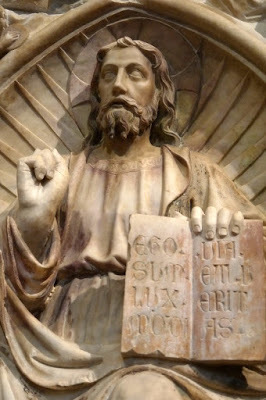
Romans 3:
Now we know that whatever the law says, it says to those who are under the law, so that every mouth may be silenced and the whole world held accountable to God. Therefore no one will be declared righteous in God’s sight by the works of the law; rather, through the law we become conscious of our sin.This passage is commonly used by Protestants to justify Luther’s idea of “salvation by faith alone.”
But now apart from the law the righteousness of God has been made known, to which the Law and the Prophets testify. This righteousness is given through faith in Jesus Christ to all who believe.
I think they are missing it.
Nothing here suggests that the Law—the moral law—has been superseded. No; through it “the whole world” is to be held “accountable to God.” It “testifies” to whatever Jesus represents.
To suggest that nobody can fulfill the law—that nobody is justified by it—is a very different thing from saying that nobody should try to fulfill the law, or that it is irrelevant to try.
And the difference is exactly that between a good and a bad person, between Jesus’s sheep and goats on Judgement Day.
The real point of the law, Paul explains, is to make us conscious of sin. “Through the law we become conscious of our sin.”
This involves accepting that we are not, ourselves, God; we are imperfect beings. That there is a Being and an objective moral standard that is more important than ourselves and our desires.
Which is no doubt why Jesus says, in the Beatitudes, “blessed are the meek.” With William Blake’s useful clarification: “humble before God, not before men.” Jesus himself was hardly humble in the latter sense.
When Paul says it is faith in Jesus Christ that justifies us, he does not mean faith in, say, the historical accuracy of the gospel record, or faith in the proposition that the historical person we know as Jesus of Nazareth was the son of God. He does not mean calling upon the name “Jesus” in prayer.
For if he meant only using that name in prayer, “Jesus,” it would be nonsensical. That is not even the man’s real name; it is a conventional Latinization. And how is anyone to blame if they do not know it?
If he meant belief in the proposition that the gospel is historically accurate, or that this man was the son of God, the standard is both nonsensical and immoral: morality consists in seeking truth based on the best evidence available, not in arbitrarily declaring true what you want to believe. And were it the latter, what makes one arbitrary belief better than another? On what grounds could we choose one over the other, and how could God hold us accountable if we chose wrongly?
Paul must be referring here to faith in Christ in a cosmic sense: “the Way, the Truth, and the Light,” as Jesus identifies himself in the Gospel of John.
That is the Logos: the moral law and the truth. One is justified by one’s commitment to the moral law, and one’s commitment to truth. This is distinct from always obeying the moral law—it is an acceptance that one is bound by it.
I am the Way: Morality is naturally imaged as a “way,” and the metaphor is used elsewhere in the Gospels: “Enter through the narrow gate. For wide is the gate and broad is the road that leads to destruction, and many enter through it.” Or St. John in the wilderness: “’Prepare the way for the Lord, make straight paths for him.’"
I am the Light: “light” is defined elsewhere in the Gospel of John to refer to both morality and truth:
“Light has come into the world, but people loved darkness instead of light because their deeds were evil. Everyone who does evil hates the light, and will not come into the light for fear that their deeds will be exposed. But whoever lives by the truth comes into the light, so that it may be seen plainly that what they have done has been done in the sight of God.”
This is no doubt why Jesus says, in the Beatitudes, “Blessed are those who hunger and thirst after righteousness”: the blessed are those who believe deeply in the moral law.
And, no doubt, “Blessed are the pure in heart”: those who do not dissemble or operate on ulterior motives.
For theirs is the Kingdom of Heaven.
'Od's Blog: Catholic and Clear Grit comments on the passing parade.
Published on January 27, 2020 07:42
January 26, 2020
The Word
I think my local priest holds heretical views.
At mass today, for “Bible Sunday,” he insisted that the Mass was properly understood as “two tables”: the Eucharist and the Bible readings. And, he stresses, the Church venerates them equally. We foolish lay Catholics are generally, he concludes, shortchanging the Bible.
No. That is like saying reaching the road to Ottawa is just as important as reaching Ottawa; or that a picture of my wife is just as important as my wife.
The Bible tells us about God. The Eucharist is God.
Properly speaking, I fear my pastor is advocating idolatry.
'Od's Blog: Catholic and Clear Grit comments on the passing parade.
Published on January 26, 2020 18:21
The Seventh Commandment
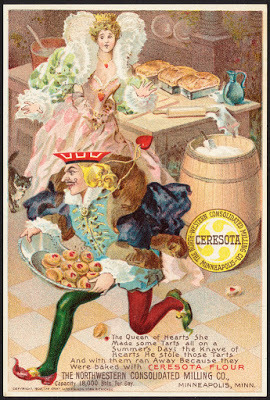
You shall not steal.
Here we have a perfectly clear and simple obligation. No infringement on private property.
Or do we?
The word we render in English here as “steal” apparently refers in Hebrew to people, not things. Jewish authorities read this as “you shall not kidnap.”
Did you see that one coming?
Locke suggested three human rights inalienable by government: life, liberty, and property. Apparently, this commandment addresses not the third, property, but the second, liberty. One has no right to take from another their natural freedom of action.
It is, then, a prohibition against slavery—against the ownership of human beings.
This must come as a surprise to all those who say that the Bible sanctions slavery.
This was based in part on the claim that the Bible never expressly prohibited slavery—as it does here—and in part on translating the Biblical term usually rendered “servant,” as more correctly “slave.”
“Bondservant,” “bondsman,” “bondsmaid” might be better: it was indentured servitude, the system that populated early America. One was bartering one’s labour over a period in return for some financial consideration. All such contracts lapsed after seven years as a maximum.
This is now classed as “slavery,” and prohibited, by the UN; leading to recent charges, for example, that America and the Caribbean was full of enslaved Irish before Africans arrived.
The essential point in terms of Bible ethics is that this was a contract, entered into voluntarily by both parties. So it was not “kidnapping.” Other than the length of the servitude, what is the fundamental difference between such an arrangement and, say, being employed at an hourly wage or monthly salary? For that hour or that month, the employer has the right to tell you what to do, to limit your freedom of action.
But now we are left with a second problem: so stealing, according to the Bible, is not wrong? No private property? That sounds revolutionary.
No, that is still covered by a separate commandment, “Thou shalt not covet thy neighbor’s goods.”
But there is also a critical distinction here. The sin, then is in the coveting, in the motive, not in the action of taking itself.
This is an important distinction, recognized both in traditional Catholic ethics, and by John Locke, but seemingly lost on most currently.
In principle, all property belongs to God, who created it, and so is to be shared equally, or rather, as needed. One acquires a personal right to any property through investing labour: then one has earned a special claim to it. If you pick the apple, then it becomes your apple. You have labour invested in it. More so if you planted and pruned the tree. If you plough the field, it becomes your field—you have buried your labour in it. If you build a business, by honest means, it is your business.
But this right to property is obviously only relative: the thing itself remains largely God’s. You only have a stronger claim than the next person.
The current idea that aboriginal people have some residual ownership of the land in many parts of Canada is based on a misunderstanding of this principle. Neither they nor even their ancestors have, by and large, invested much if any labour in this land. They have only survived on what it naturally produced. Accordingly, they have no ownership of it.
Now suppose someone else comes along who is in dire need. You do not need it; you only like having it. This then can trump your claim. If they just take what they need, it might be stealing under the law, but it is not immoral—because it was done of practical necessity, not covetousness.
This is the foundation for the Catholic doctrine of a “preferential option for the poor.”
This is also the essence of the story of Dives and Lazarus: Dives goes to hell for not sharing his wealth; which, without understanding this commandment, seems unfair. Wasn’t it his to do with as he pleased? In moral terms, since Lazarus needed food, and Dives had far more than he needed, he was sinning by not sharing it—he was stealing it from Lazarus.
'Od's Blog: Catholic and Clear Grit comments on the passing parade.
Published on January 26, 2020 10:41
January 25, 2020
MacKay Weighs In
Seems to me it was a VERY good speech that hit all the right notes.
But this does not especially reflect on MacKay--he's got a really good speechwriter.
The campaign logo is also great.
A really professional effort.
He also did well by giving so much of his speech in French. He is surely aware that this is a vulnerability. I thought his French pronunciation, at least, was decent.
We'll see how it goes.
'Od's Blog: Catholic and Clear Grit comments on the passing parade.
Published on January 25, 2020 16:06
A Tangled Web We Weave
 White sage smudge sticks.
White sage smudge sticks.Here’s a bit of a mess: a school in BC held a smudging ceremony, as a “reconciliation” measure to acquaint students with indigenous culture. Students were obliged to attend.
A local Christian parent objected, on the grounds that this was promoting indigenous religion, and forcing it on their child.
A court ruled it was permissible, because the ceremony was a part of indigenous culture, not a religious practice.
Now Convivium magazine is upset, on the grounds that this demeans indigenous spirituality by claiming it is not religious.
You can’t win.
For the record: we agree that smudging is not a religious practice. It is cultural. Christian Indians smudge. Just as an evangelical Christian might burn patcholi incense in their home, without intending thereby to venerate some Hindu goddess. If, during the ritual, the performers/participants called on some spiritual entity, then that is the problem. The school claims there were no prayers.
The confusion comes from a popular movement to elevate all manner of indigenous practices to the level of religion. Like the imaginary religious office of “elder.” Or claiming this or that natural landmark is “sacred.”
Convivium worries that the same logic might permit, say, the banning of the hijab, on the grounds that it is not really religious.
But that would be correct: the hijab is not a part of Islam. It is banned in many Muslim countries.
Convivium’s argument could as easily be used to force the authorities to allow female genital mutilation, on the premise that it is “required by Islam.” It is not; it is a cultural practice in some majority-Muslim countries.
The essential point of freedom of religion is freedom of conscience. To be protected, a cultural practice must be demonstrated as clearly required by some established faith on moral grounds.
'Od's Blog: Catholic and Clear Grit comments on the passing parade.
Published on January 25, 2020 08:45
The Growing Threat of Dollar Stores
 Parkdale Dollarama, Toronto
Parkdale Dollarama, TorontoThere is a movement underway, I read, to ban or limit the number of Dollar Stores. CNN gives the case against them, briefly, as “discount chains stifle local competition and limit poor communities' access to healthy food.”
“Advocates of tighter controls on dollar stores say the big chains intentionally cluster multiple stores in low-income areas. That strategy discourages supermarkets from opening and it threatens existing mom-and-pop grocers, critics say.”
There is, it seems to me, a problem with that logic. The Dollar Stores are not limiting or stifling competition; they are competing successfully. It would be measures discriminating against them that limit or stifle competition.
This is surely no different in principle from a town with two grocery stores deciding that Joe’s store must close in favour of Lee’s store. And on the grounds that Joe’s prices are too low?
To say the Dollar Stores are intentionally clustering multiple stores in low-income areas to discourage supermarkets from opening makes no sense either, on the obvious grounds that Dollar Stores must make a profit. If they are concentrating in a certain area, the traffic must be sustaining this; moreover, it must be more profitable to locate a second store here than in some upmarket area.
Which is hardly a surprise for a bargain store.
As to their limiting poor communities’ access to healthy food, this is arguing that giving people more choices gives them fewer choices. If there is a market for healthier food at higher prices, then it is still there for some other merchant to fill.
In fact, here in Toronto: I see a standard pattern. A Dollar Store always opens next to a discount supermarket. Often they share the same building. The two are obviously complementary. You cannot buy everything you need at the Dollar Store. I cannot believe anyone does, or could, do the bulk of their grocery shopping at one. Their business model limits the Dollar Stores, generally, to non-perishables with a longer shelf life.
You go there for the bargains, then fill out your weekly needs next door at the supermarket.
The supermarkets, interestingly, still stock the same items as the Dollar Stores. You would think, if the Dollar Stores really were so lethal to competition, these supermarkets next door would concentrate on stocking only what the Dollar Stores do not. Instead, they still find it profitable to provide full service.
So what is behind this drive against the Dollar Stores?
I think it must be simply hatred of the poor. They are unsightly. Being made aware of their existence, seeing them in your neighbourhood, makes you feel guilty.
But the sickest thing is how this is all presented as a desire to “help” the poor. CNN headlines the issue: “Dollar stores are everywhere: That’s a problem for poor Americans.”
Another telling example of the general principle that, if you are planning to do something truly nefarious, you always represent it as the exact opposite.
'Od's Blog: Catholic and Clear Grit comments on the passing parade.
Published on January 25, 2020 07:13
January 24, 2020
Is Hell Eternal?
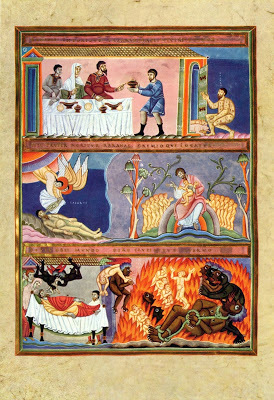 Dives and Lazarus
Dives and LazarusA friend who was once a member of the Unification Church (the “Moonies”) recently mentioned to me that they believe no one goes to hell; or perhaps better stated, hell is not eternal.
This sounded heretical in Catholic terms—but then I remembered that von Balthasar, or Bishop Barron, advance the idea that, while hell must exist, it is still theoretically possible that there is no one it in. And that would amount to the same thing: the bad perhaps spend a long time in Purgatory, but no one is finally abandoned.
This idea is appealing, because it is hard to understand why God would create some for eternal torment. This does not seem merciful. It does not even seem fair. Suppose a very bad man, like Hitler, has caused unspeakable suffering to 20 million people. Would justice not be served if, in purgatory, he himself experienced the full measure of all the suffering he had caused? If this is not enough, wouldn’t twice all the suffering he inflicted? Ten times? That is still not eternity.
But then it seems to me there are problems with this idea. To begin with, it is hard to reconcile it with the Gospel. In the story of Dives and Lazarus, for example, Jesus seems to plainly say that Dives is in hell, and there is no path that can take him from there to heaven. Then there are the images of separating the wheat from the chaff, the sheep from the goats. These images do not seem to work if, in the end of all, the wheat and the chaff are back together, and the sheep herd with the goats.
There seems to be, beneath this, an argument that, if everyone gets to heaven, there is no good reason for God to have created this life. This life would seem to be a testing ground, a valley of soul formation. It does not seem to do that if everyone passes the test.
To deny the possibility of hell also seems to diminish free will. What is the sense of giving man free will if he cannot freely choose the ultimately wrong course? That’s something less than true free will, then.
There is another issue as well. Not all sin is against one’s fellow man, or other creatures who can suffer. Sin is not necessarily the infliction of suffering on others. Who suffers if you secretly covet your neighbour’s wife? In this case, it cannot be atoned by experiencing said suffering oneself.
The most serious sins, indeed, are against God, who cannot suffer. And it is exactly this, sin against
God, that the Church says leads to hell—it is rejecting God.
Jesus, asked what is the greatest commandment, answered “To love God with your whole heart, and your whole mind.”
He called blasphemy against the Holy Spirit “the unforgivable sin.”
In the Ten Commandments, the first three (or four, depending on your division) are sins against God, not your neighbor. Being listed first suggests they are first in importance.
Is God being selfish to make sins against him so much more important?
I do not think so. Define God, or his Logos, as the Truth and the Good. Jesus says something like this: “I am the Way, the Truth, and the Light.”
Now, which is worse, telling a lie, or denying that there is any such thing as truth?
Surely the latter is sinful on a higher plane.
Which is more sinful, committing a sin, or denying that there is such a thing as sin, as right or wrong?
Surely the latter.
So the first example, committing a sin, gets you to purgatory; but there has to be a higher level of retribution for turning your back on the whole premise of being good or telling truth.
Hence there must be some state qualitatively different from Purgatory to which one would go.
And, if you have rejected Truth and Good as goals, it seems impossible for any length of time in purgatory to allow you to achieve either goal.
'Od's Blog: Catholic and Clear Grit comments on the passing parade.
Published on January 24, 2020 10:44
Poilievre and the Bottom Drop Out
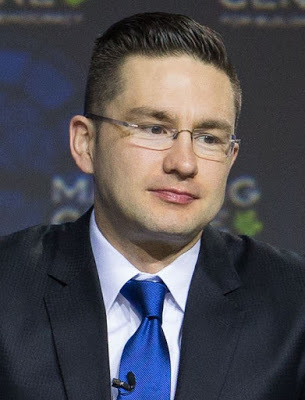
Something has to be going on behind the scenes in the Tory leadership race.
It was not so surprising that Jean Charest took a pass, after earlier reports from Tom Mulcair that he was definitely in. But then Rona Ambrose dropped out right after him. Weird; Charest dropping out gave her a clearer field. And now Pierre Poilievre—who had already put together a powerful campaign team, and booked the hall for his kickoff in just a day or two. Obviously a sudden change of heart. Yet he must have seen his own chances boosted in turn by the other two not running.
These were, other than Peter MacKay, the three candidates with the best chance of winning the leadership.
Are they really all dropping out to hand it to MacKay?
That does not seem right. Politicians crave power.
MacKay has obvious vulnerabilities. His French is weak; Quebec and Ontario consider this critical. That’s most of the country. He is from the Red Tory wing, the smaller wing of the party ideologically. The party split in the past over that distinction. He is not from Western Canada, where most Tories live and where separatist sentiments are growing. These are natural bases from which to mount a challenge. His own regional base, in Atlantic Canada, is relatively small.
One would expect other politicians to see a strong opportunity here, as the standard-bearer of Quebec, of the West, of the libertarian wing, of the social conservative wing. Yet the big guns are not interested.
At the same time, the Tory leadership at this moment should look highly desirable: there is every chance of winning the next election against a weak and wounded incumbent.
So some vital piece of information has to be missing. Something that Poilievre, and Ambrose, and perhaps Charest, know, that we do not know.
Another surprising and unexplained thing happened just before all this: the sudden resignation of Stephen Harper from the party fund. Harper made a sudden move; and then all these other sudden moves in his wake. Perhaps that is out clue.
The obvious reason why Harper resigned was in order to become involved in the leadership contest. He could not do that from his official post. Rumours were that this was to block Charest. But it seems uncharacteristic of such a cool, self-controlled man as Harper if this was personal.
More probably the problem was not with Charest specifically, but with what he seemed to represent: a reverse takeover of the party by its old Progressive Conservative wing. But on these grounds, Peter MacKay should look about as concerning. He too, like Charest, is a former PC leader.
So why then wouldn’t Harper throw his support behind Ambrose or Poilievre, either of whom look like they have a good shot at defeating MacKay? And why, if such support was pledged, would they immediately drop out of the race?
Because, perhaps, none of these are adequate alternatives.
As a practical matter, all these candidates have their flaws. While Poilievre is more likely to appeal, say, to the right wing of the party, that just gets us back, it seems, to where we were with Scheer.
So Harper, and now Ambrose and Poilievre, are perhaps holding off for another anticipated candidate, someone of greater stature, someone better positioned to unite the party and win the next election.
Who might that be?
Only one name comes to mind.
Stephen Harper.
Don't hold me to it--but it looks like the simplest explanation.
'Od's Blog: Catholic and Clear Grit comments on the passing parade.
Published on January 24, 2020 05:25



